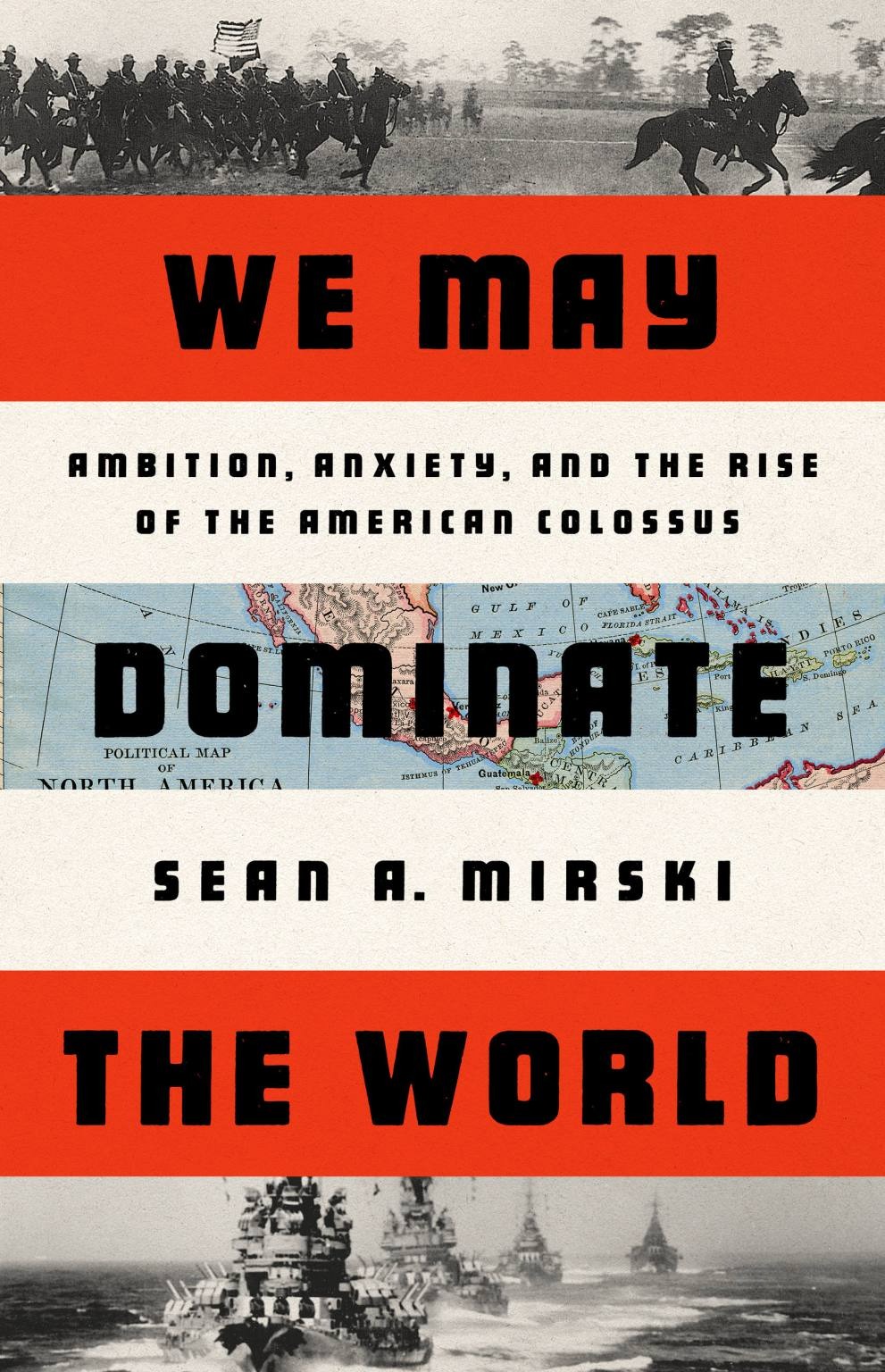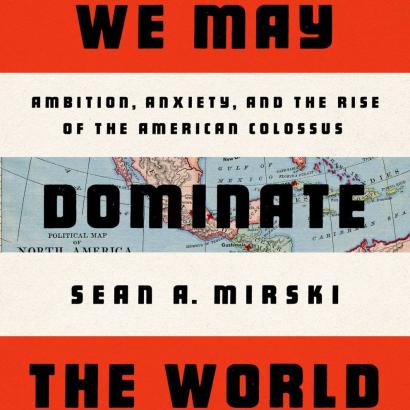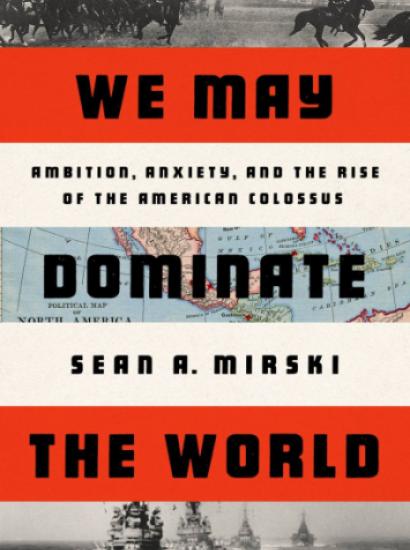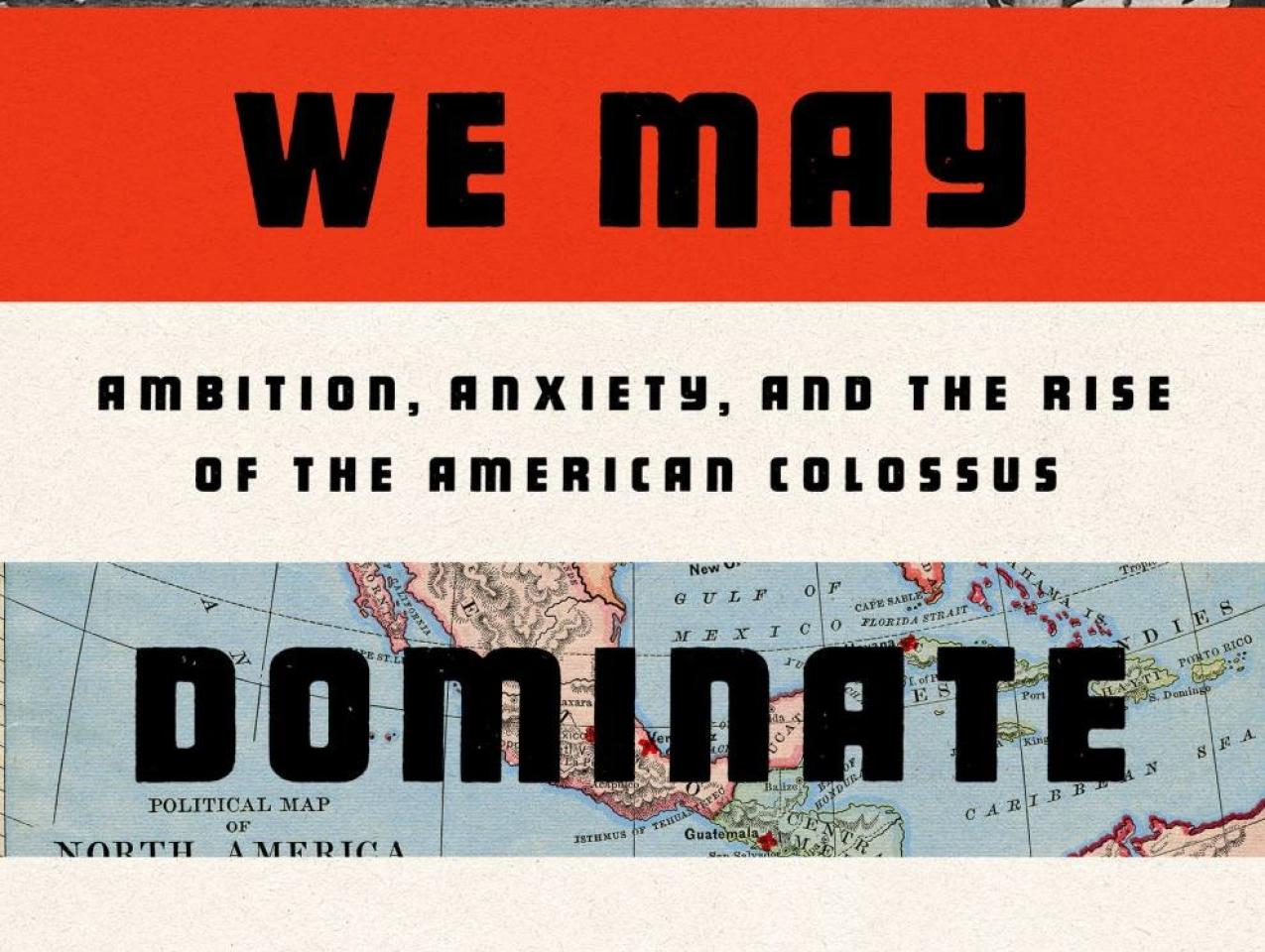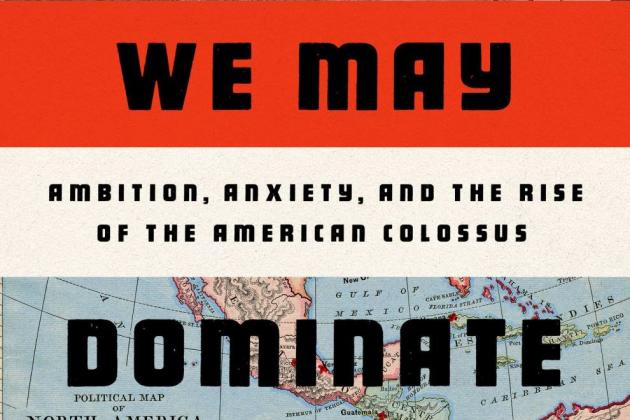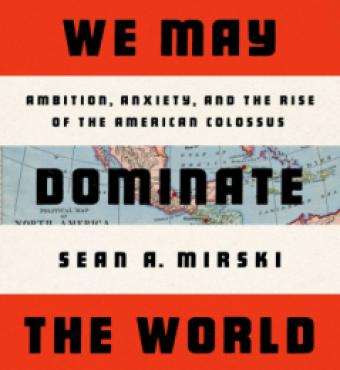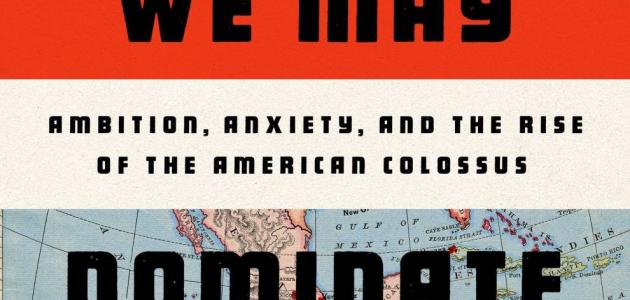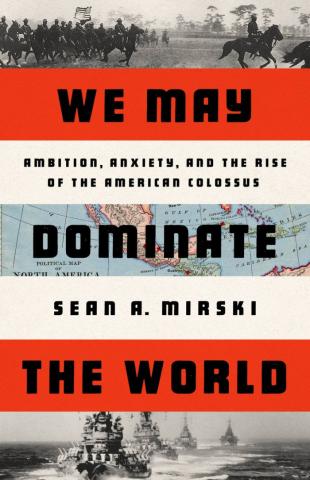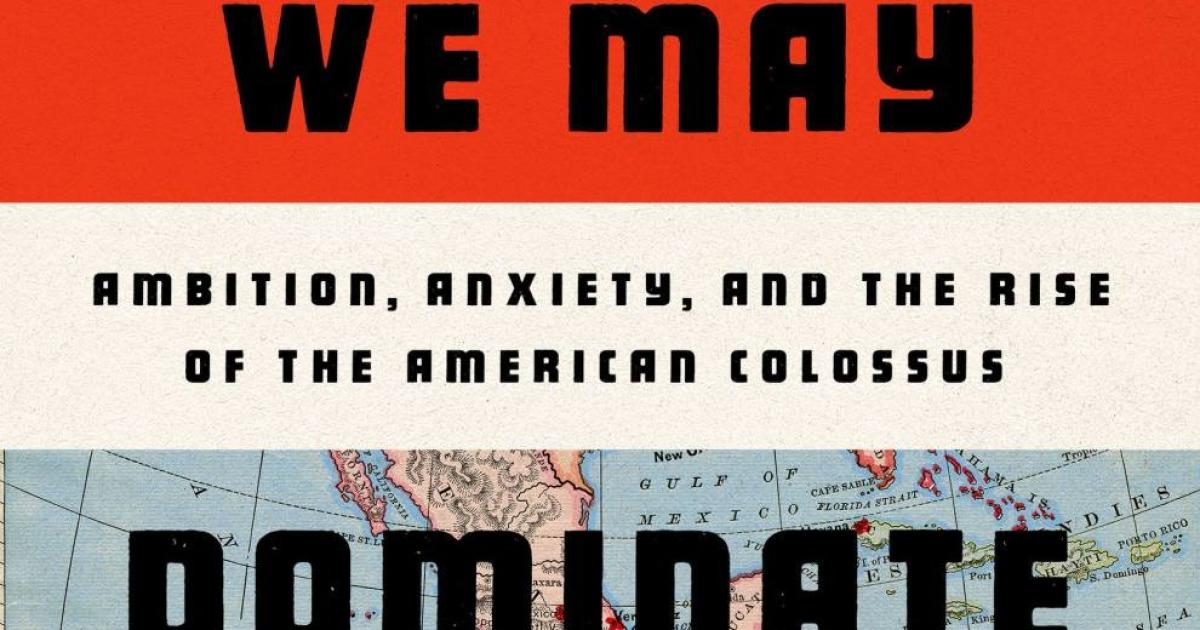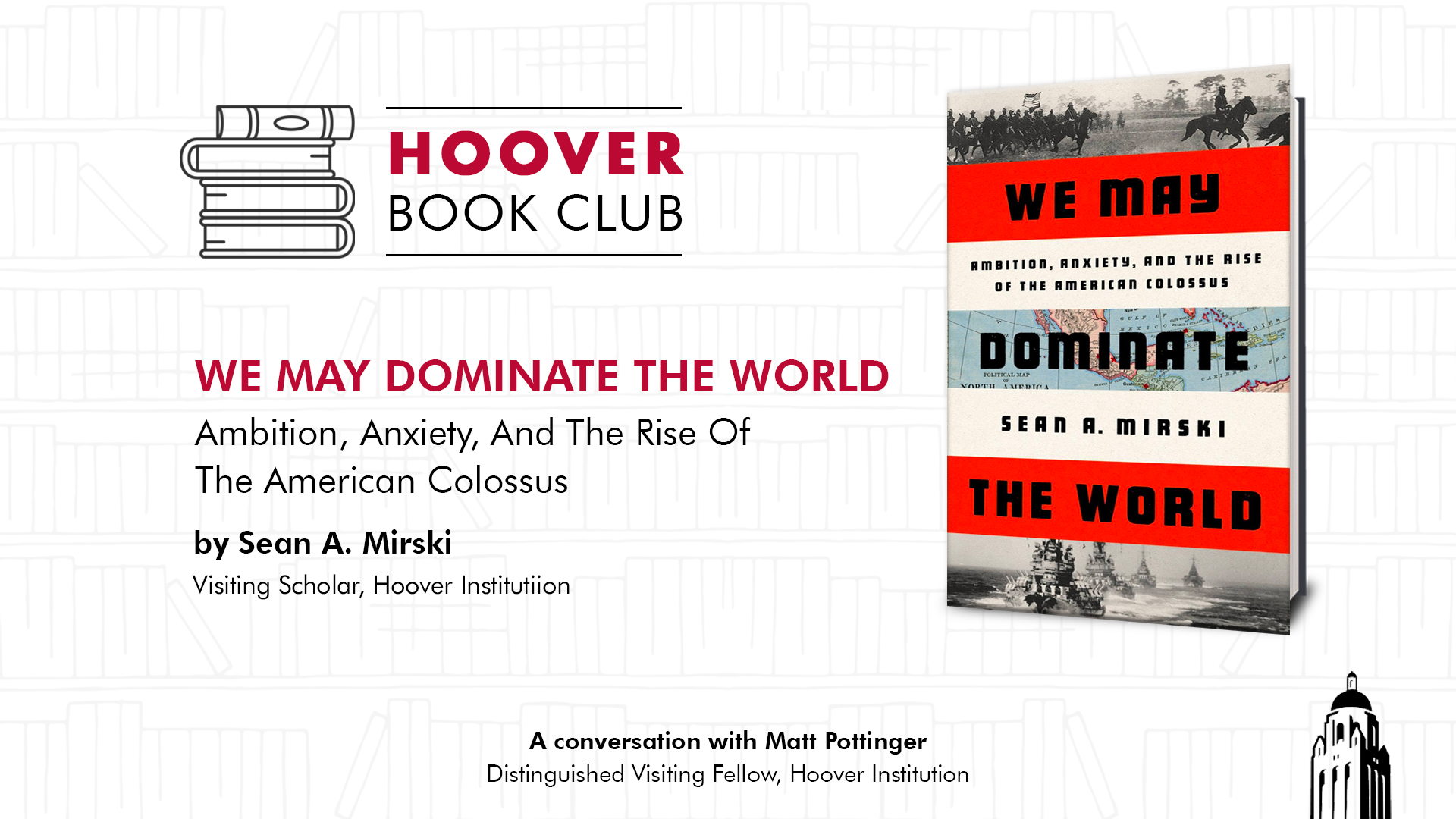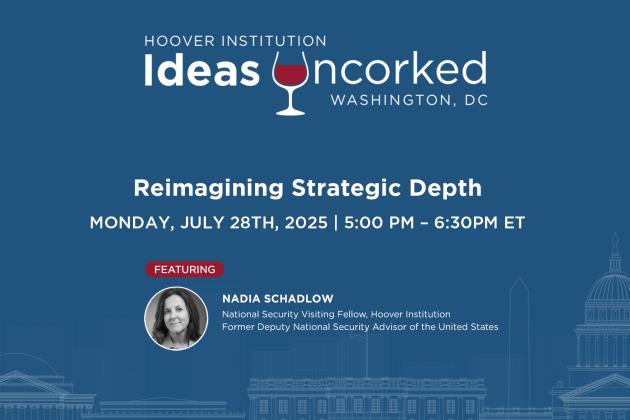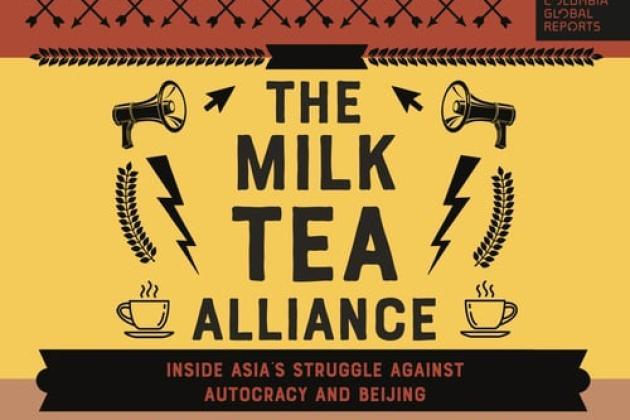Join the Hoover Book Club for engaging discussions with leading authors on the hottest policy issues of the day. Hoover scholars explore the latest books that delve into some of the most vexing policy issues facing the United States and the world. Find out what makes these authors tick and how they think we should approach our most difficult challenges.
In our latest installment, watch a discussion between Matt Pottinger is a distinguished visiting fellow and Sean Mirski a Visiting Scholar at the Hoover Institution on Sean's book We May Dominate The World: Ambition, Anxiety, And The Rise Of The American Colossus.
Thursday, July 27, 2023 | 10:00 am PT / 1:00pm ET
WATCH HERE
>> Matt Pottinger: Thanks for joining us today. I'm Matt Pottinger. I'm a Distinguished Visiting Fellow at Stanford University's Hoover Institution. And I'm very delighted to welcome in our latest installment of the Hoover Book Club, where we bring Hoover fellows and friends together to discuss their latest writings. And today we've got Sean Mirski with us.
Sean's a Visiting Scholar at the Hoover Institution. Sean's worked for a long time as a lawyer and a US policy scholar covering national security issues that have ranged across multiple US presidential administrations. Sean is a term member at the Council on Foreign Relations and practices national security and foreign relations and appellate law at Arnold and Porter.
He is the author of We May Dominate the World, Ambition, Anxiety, and the Rise of the American Colossus. Sean, welcome today. Thanks for joining.
>> Sean Mirski: It's a pleasure to be here. Thank you for hosting this.
>> Matt Pottinger: Yeah, so this is, there are a number of books that have been coming out recently that go back in US history in a way that is incredibly timely.
Almost shockingly so for those of us who have either forgotten lessons of our history or have looked at our history only through the lens of our domestic political quarrels and the like. But I think you've given a very even handed treatment of really the rise of the United States as a regional hegemon, which is, I think we'll talk about today, a very unique, in fact, it is a singularly unique status for a great power.
The United States is the only regional hegemon, but there are others that are aspiring to create regional hegemony. And as you write, that is the key to global power. And so why don't you tell us a little bit about the main thesis of the book, what you found, and we'll have a conversation from there.
>> Sean Mirski: Absolutely, so to start, I guess it's helpful to define terms. So political scientists like to define the term regional hegemon as essentially a situation where a great power has no other great powers in its neighborhood and faces no serious threat from other great powers in its neighborhood.
Which sounds like a very, very simple thing to achieve. But as you noted in the modern day, no great power has actually ever managed to accomplish it, with the exception, of course, of the United States. And we accomplished the status, I argue, in the book, essentially from the period of the civil war up to World War one and then a few decades beyond.
And so what the book tries to accomplish is sort of telling the story, both of why we are aiming at this status, what it cost us to get it, and what the consequences of that were. And so I hope that most readers walk away from the book with essentially sort of three kind of broad takeaways.
The first is simply just the story of what it took for us to kind of accomplish the status. And at one level, I think the story is a familiar one to Americans. During this period, we were relatively jealous of the Western Hemisphere, and we were relatively proactive in making sure that other great powers didn't tread on the Western Hemisphere and in general expand their influence.
And so things like the Spanish-American war, where we kicked out the Spanish empire, and other kind of war scares relating to the great powers were kind of a necessary part of this rise. But at the same time, one of, I think, the maybe underappreciated aspects of the story is the extent to which we also began intervening in our neighbors, particularly in the Caribbean and Central America.
And one of the truisms of history is that rising powers tend to be aggressive and expansionist. The historical record, I think, is relatively clear on that. And as I'm sure we'll talk about later today, there are certain rising powers today that arguably fit that description as well. One of the things that I didn't really appreciate until I started diving into the research was the extent to which the United States really fit that mold as well.
And in particular, there's this two decade period from 1898 to 1918, where the United States essentially went on a tear through its hemisphere. We were using force almost an average of twice a year against our neighbors. Some of those uses of force were relatively minor in the grand scheme of things.
It was the landing of US Marines to protect an embassy during a civil war revolution. But many of the uses of force were significantly less minor than that, including eventually the occupation of entire nations. For many years, we annexed entire nations, we created protectorates. We began running the fiscal systems of these nations, even if we weren't formally occupying or governing them.
And in general, there's this streak of kind of interventionism that really kind of builds on itself over time. And once you get to the Wilson administration, there's just this explosion of American military involvement in the region. And so it's part of American history. I think that is not, I think it would be fair to say the finest moment of American foreign policy.
But the second thing that the book hopes to sort of accomplish is to explain why it is that we did this. And to the extent people are sort of aware that we weren't on our best behavior during this period. I think a lot of the conventional explanations tend to revolve around either sort of ideological explanations, ranging from kind of imperialist ideas to the white man's burden.
Or they tend to revolve around economic greed and sort of the idea that, let's say, banana companies or Wall Street banks were running American foreign policy. And one of the arguments that I make in the book is that neither of those kind of conventional explanations is really right.
I argue that more than anything, it was actually great power competition that sort of drove American actions. And that in particular, American behavior, as aggressive and offensive as it indisputably was, was paradoxically motivated by defensive motivations. And the kind of central idea here, and the kind of the context that I think is really important for readers and listeners to understand, is that during our rise to regional hegemony.
The rest of the world was experiencing what historians sometimes call the second age of imperialism, which builds on the first age of Christopher Columbus and the conquistadors. And the second age of imperialism was essentially when Europe's great powers went on this colonialist rampage through the rest of the world.
So if you've heard of the scramble for Africa, that was this period. But in general, it wasn't just Africa, it was Asia, it was the Middle East. By the time you get to 1914, something like 85% of the earth's landmass is under the control of colonial powers. And in Africa, Asia, and the Middle East, you can literally count on one hand the number of independent states remaining.
It is the kind of colonialism was that complete. And for Americans, there was this crippling fear, I think, that really kind of could fairly be described as a crisis mentality. That Latin America was next, that the European powers, having finished colonizing the rest of the world, would soon move on to the western hemisphere.
And much of American foreign policy during this time was aimed at essentially ensuring that that didn't happen, that Europe never got that foothold, that the scramble for Latin America never started. The problem that the United States faced, though, was that a lot of its neighbors were incredibly weak.
They were unstable politically, they were unstable economically in ways that I think today we might call a failing or failed state. And from the United States perspective, this was a real problem because this sort of instability created a power vacuum that Europe could easily fill. And that for various reasons, Europe's great powers would have a much easier time intervening and expanding into these unstable states than they would into relatively stable and established states.
And so the United States basically made it the central goal of its foreign policy to stabilize and strengthen its immediate neighbors to prevent European expansion. But the US never really figured out a very good way of doing that. It tried doing it initially sort of indirectly from the outside with trade and diplomacy.
But over time, what you saw was a gradually increasing level of involvement on the part of the United States that went into its neighbors internal affairs in an attempt to sort of stabilize them from within. And this, again, started out, I don't wanna say innocuously, but it started out with relatively minor levels of involvement, but eventually kind of escalated to the logical endpoint of full scale occupation.
And so the second kind of lesson from the book is really why we did this and sort of the ways in which that kind of might repeat today. And then the third and final part of the book is, as I mentioned, we'll discuss a little bit more. What are the lessons we can draw from this period to the United States's foreign policy today, as well as to the foreign policy of other great powers.
>> Matt Pottinger: It's great. I love that you quoted the US Marine Corps small wars manual in your book, because the Marines kept getting sent over, and over, and over again during that period that you were talking about when the US really did kinda run amok. And it was funny, when I was a Marine preparing for my deployments to Iraq and Afghanistan, I was consulting that manual again just to learn lessons about counterinsurgency from it.
But look, the Monroe doctrine, which we often think about through the lenses that you mentioned just now, that it was either American corporate greed that drove our grand strategy or sort of racist and imperial ideas. People forget that the Monroe doctrine really began as, and I think was meant as an anti-imperialist, anti-colonial doctrine.
Remember, you wrote about Monroe informing Congress? The quote was something along the lines of that the American continents, he told Congress, are henceforth not to be considered as subjects for future colonization by any European powers. So what are some of the lessons that we can learn today in order to strengthen our ties with our neighbors in the Caribbean and in Latin America so that they aren't weak states that could again be exploited by distant foreign powers?
I mean, what are some of the lessons today a more well informed version of grand strategy that could prevent us from finding ourselves in a weakened position?
>> Sean Mirski: So one answer is, I think, just understanding the legacy of these interventions. Americans, I think, for the most part, have certainly forgotten that we occupied Haiti for 19 years, that we occupied the Dominican Republic public for 8 years, and then again later.
The Haitians and the Dominicans have not forgotten. And in general, the Latin Americans have not forgotten our kind of interventionism during this period, as well as during the Cold War. And so I think the starting point for any sort of sensible regional policy simply has to be a recognition of the historical background against we're now acting.
And so I make the argument in the book that the Monroe doctrine certainly sprung from defensive ideas. And I think for the most part, even if it was executed very offensively, was still primarily motivated by defensive ideas. But from the perspective, obviously, of Latin American countries, it doesn't really matter whether the motivation is corporate greed, or imperialism, or defense.
If you're getting invaded, you're getting invaded, and it still stings just the same. And so one of the key lessons, I think, for today is for the United States to be relatively careful in throwing phrases like the Monroe doctrine around, at least in its official policy. Certainly, when administrations go out and say, we're bringing the Monroe doctrine back, that means something very different to them and to Americans than it does to our neighbors.
And even if ultimately the substance of the policy is unobjectionable, there's at least a sort of branding kind of PR effort that's important not only from the perspective of kind of surface level superficialities, but in terms of making sure that those relations don't start off on the wrong foot.
But then the second lesson is the United States, I mean, this book, if it had come out 20 years later, might have been a little more provocative on this particular point. But one of the points I make in the book is that our attempts to stabilize our neighbors using force were essentially forcible nation building efforts, and they were uniformly unsuccessful.
The United States wanted desperately to stabilize and strengthen its neighbors with the minimum use of force possible. The problem was every time it intervened, it tended to make the situation worse. It created more instability. And there was this kind of vicious dynamic, where the US really couldn't abide instability in the region because of what it meant for European expansion.
But every time the United States got involved to decrease that instability and ended up making it worse. And so the dynamic eventually, as I mentioned, led to these occupations as the sort of logical endpoint. And one of the key, I think, takeaways is that this sort of externally imposed stability is almost a contradiction in terms.
And that when the United States is thinking through its policy, it's not that intervention should always be off the table, but that there has to be a real understanding that trying to nation build. If it's even possible, requires so much more in terms of blood and treasure than I think most policymakers would assume going in.
Again, not a particularly insightful lesson 20 years after the invasion of Iraq, but certainly one that I think policymakers still need to keep in mind.
>> Matt Pottinger: Absolutely, let me ask, there's a seductive idea in some quarters today that if the US were to cede spheres of influence in other parts of the world, but continue to try to keep great powers out of our backyard, that that would be a stable workable sort of modus vivendi coexistence.
But where we back out of Other parts of the world. Talk a little bit about what we know from the history of our own difficult journey and the journey of those European great powers that we managed to elbow out of the region. What would it mean for the United States if we were to buy into a sphere of influences argument today?
>> Sean Mirski: The lesson from the United States' own rise is that I think the United States will always have a vested security interest in preventing any other great power from becoming a regional hegemon. And the reason why is relatively simple and, I think, intuitive, which is that if you are a regional hegemon, by definition, you have eliminated every other great power from your neighborhood, or at least neutralized them.
And that means that you don't have to keep significant military forces in your neighborhood. You don't have to worry about political or kind of diplomatic machinations in your neighborhood by other great powers. Instead, with no enemies at your gates, you can venture abroad, sort of as your interests dictate.
And so one of the kind of consequences of the United States gaining regional hegemony by the end of World War one was that nothing was tying us down to Latin America, and that when crises or events in Asia, Africa, Europe, anywhere else sort of began developing, the United States was free to get as involved as it wanted.
And I'm sure listeners will debate to what extent all those interventions have been productive or a good idea. But at least in terms of, for example, World War II, it's instructive that while every other great power in World War II finished the conflict in a much worse position than it started it in, the United States emerged supercharged.
There was almost no fighting on American soil itself. The Philippines is a partial exception, since that was still technically part of the United States. But because it was already scheduled for independence within a few years, it's not clear whether that really counts. But in general, the United States had the luxury of fighting these wars off its home territory.
And so during World War II, you actually saw the us standard of living rise as a result of the war, whereas, of course, everywhere else, these countries were getting devastated. And then, of course, during the cold War itself, the fact that the United States did not have to worry about any great power in its neighborhood meant that it could carry this policy of containment to Europe, to Asia, to eventually the Middle East and Africa.
And so one of the questions that I don't think gets asked enough is that why is it during the cold War, that the United States was containing the Soviet Union, as opposed to the Soviet Union trying to contain the United States? And I think the answer is in large part, the regional hegemony that we had accomplished decades earlier.
You could easily have imagined a world where the Soviet Union had established itself in Europe, and then almost all of the cold war would have been fought in these proxy wars in Latin America, which ended up happening to a certain extent. But it certainly wasn't the kind of full scale containment policy that the United States was pursuing of Soviet Russia.
And so today, when people suggest that, well, we can just cede Europe to Russia and we can seed Asia to China, the long term consequences of that are not that there is this sort of stable equilibrium. It's that these nations, in turn, are gonna have much more ability to then go abroad and potentially start interfering in the western hemisphere itself.
>> Matt Pottinger: Yeah, and so what are the powers today that aspire to achieve regional hegemony?
>> Sean Mirski: So I think every power from China all the way down to Montenegro would like to be a regional hegemon. It is just was simply not a realistic prospect for Montenegro. Apologies to any listeners for Montenegro.
I think that certainly the three powers that I talk about a little bit in the book are Iran, Russia and China. Of those, I think, Russia very much aspires to at least a sphere of influence again. But as its troubles in Ukraine suggest, I think it's pretty far from kind of accomplishing that.
Its military is having real trouble just dominating one neighbor. And, of course, Europe is also kind of invested in checking Russia. And then in the long run, of course, there's a tension between Russia and China that would make it, I think, very difficult for Russia to achieve kind of full regional hegemony in the kind of conventional sense of the term.
Iran's coming a little bit closer, in large part, unfortunately, because of the Iraq war. The sort of stable balance of power that used to exist in the Middle East between Iraq and Iran was completely thrown out of whack. And now Iran doesn't face much in the way of sort of meaningful opposition in the Middle east aside from the United States and to a lesser extent, countries like Israel and Saudi Arabia.
I don't think you necessarily see a real prospect of Iran becoming a full regional hegemon anytime in the next, let's say, decade. But that's certainly one power that is, I think, aspiring to that status. The power that's really, really trying to become a regional hegemon right now and probably has the best chance is China itself.
China, of course, is really the only near competitor or actual competitor to the United States in terms of economic size, military force and all that. And, of course, as we've seen both recently, but also really over the last few decades, its entire foreign policy, in a lot of ways, is aimed at essentially expelling the United States from East Asia.
And that is, in many ways, a sort of mirror repeat of what the United States was doing a century ago vis a vis European great powers.
>> Matt Pottinger: So the great powers in early after, when Monroe was president, and in the decades that followed, we benefited. And you write about the fact that we essentially benefited from the ways that those powers kept one another in check.
In other words, it wasn't that they were impressed with the United States, a fledgling country. People laughed at the Monroe doctrine in Europe to the extent that they even noticed it. But Spain was careful sometimes. France was often careful, not for fear of what we would do if they ventured in, but what the United Kingdom would do or another local power.
How do you compare that to the moment today where we have a, quote, no limits pact between Xi Jinping and Vladimir Putin? You have growing ties between China and Iran, between Iran and Russia, this sort of iron triangle. I saw a report today. I haven't confirmed it yet, but there's a report that China is gonna buy 50,000 suicide drones from Iran to threaten US forces in the western Pacific and Taiwan.
Are we facing a much more formidable set of adversaries that are better coordinated than perhaps at other periods over the past couple hundred years?
>> Sean Mirski: I think there's a lot to that point. As you mentioned, one of the most important factors in the success of the United states rise to regional hegemony wasn't that Europe wasn't actually interested in the western hemisphere.
I mean, for instance, Germany, the Kaiser before World War I was very interested in colonizing Latin America. You look at sort of internal German documents and And there's all sorts of marginalia from the Kaiser in which he's talking about Pa, the Monroe Doctrine, never fear, we should send our fleet in and so on and so forth.
But the german position on the continent was not one in which it was easy for Germans to send a massive military expedition to the western hemisphere and to risk war with the United States. They had to worry about France, they had to worry about Great Britain, and, of course, they had to worry about Russia, which at the time was perceived as this rising power that was really going to threaten Germany in the long run.
And so one of the major benefits the United States had during its rise to power was the fact that all of its chief rivals were internally distracted, and that even if they were interested in the western hemisphere, it was never enough of a priority for them to challenge the United States directly.
And so I would say, honestly, that the last moment that Europe really had a viable shot at stopping the United States was probably the civil war itself, where Great Britain and France very seriously considered intervening on the south's side, despite, at least in the british case, a real kind of abolitionist set of principles, in large part for the balance of power kind of aspects of that.
But the US kind of survived that, barely. And then after that, I think it was. It was very difficult for Europe to get its house in order. Today, the situation is different, I think, in two respects, vis a vis China. So one, as you mentioned, is that there is this sort of increasing, alliance would maybe be too strong a word, but increasing access between Iran and China and Russia and other states.
That feel, for various reasons, that the US led international order is not in their interest. And I think our sort of revisionist powers in that respect, and the cooperation among them, and the fact that traditional enemies like Russia and China are, rather than being at each other's throats, kind of, you know, joining arms against what they see as a common threat is certainly concerning development for the United States, not least because China, on its own, is also, in many ways, a much more formidable threat than any of the european great powers was.
On the flip side, however, the United States is very lucky in one respect, which is that there are many other powers in China's neighborhood that whether or not you would classify them as a great power, are strong enough that they can really, I think, present a real threat to chinese aspirations for regional hegemony.
And so India, Japan, to a lesser extent, Australia, and powers like Vietnam, I mean, these are neighbors that are not thrilled about the way that Chinese foreign policy is trending and are interested in sort of making common cause with the United States in that respect. And so I think one of the most important things for american foreign policy today is to recognize that our alliance network in East Asia is one of the most formidable, I think, cards we hold in our hand right now.
>> Matt Pottinger: Is China drawing some of the wrong lessons from our experience? I mean, you spoke about how, in many respects, it is a mirror image of the US 120 years ago. During that period, I hear Chinese officials sometimes referring to the South China Sea as their Caribbean and defending their actions to try to push us out of the neighborhood is a perfectly natural expression of American style, great power politics.
Is China doing a good job of it if they're trying to replicate what we did, or are they making mistakes?
>> Sean Mirski: So I think it's a mix of both. I mean, certainly they've learned some of the more important lessons about just the need to essentially. The fact that they're aspiring to kick the United States out of East Asia is, I think, a relatively natural motivation, and one that I think reflects an understanding that their security interests are impacted by sort of having the US presence there.
But at the same time, I mean, certainly under at least President Xi. But I think going back even further, there has been, I think, from the Chinese perspective, an insufficient appreciation of the ways in which aggressive foreign policies can lead to blowback and pushback. That, again, is not just about PR or people saying mean things to you at diplomatic conferences, but that has actual security consequences.
And so when China bullies its neighbors over some relatively minor issue that doesn't actually impact its security, those neighbors, it's more than just complaints from them. There's a real sense in which, okay, well, if I have to choose between China and the United States, one is a power that's right here, and that is threatening me directly.
And one is a foreign power that, for all its faults, is far away and relatively more Pacific in its intentions. And so I think there is sort of an increasingly kind of aggressive tone in Chinese foreign policy that is perhaps not wise and that doesn't necessarily appreciate the fact that there are consequences to being a wolf warrior.
There are sort of. It pushes your neighbors away from you and towards your rivals in a way that, in the long run, makes your job much more difficult.
>> Matt Pottinger: So one of the influential theorists during our rise was Alfred Thayer Mahan, who wrote a lot about the Eurasian supercontinent, and that whoever controls that really controls the destiny of the world.
He viewed naval power as really the key, the key mode for exercising power at a distance. Chinese theorists have been heavily influenced by Mahan. Is he the right model today in light of technology? China's now built a navy that has more vessels than the United States in rapid time.
But was that the wisest use of their funding?
>> Sean Mirski: It's an interesting question. I would say two things impressionistically on that. First is that much of Mahan was sort of based on coal based navies that needed coaling stations. And so there's a certain kind of technological anachronism that comes across when reading Mahan.
But on the whole, I think his sort of strategic lessons are more or less right. That if you can control what today we would call the global commons, that really is sort of the key to long term success. And for Mahan, it was always international trade as sort of the ultimate source of a nation's power.
And at the time it was mostly seaborne trade. And so that seems right. I mean, and China's rise itself has mostly been fueled by international trade. And so to that extent, I do think that many of sort of Mahan's overall kind of strategic, his sort of overall lessons about the rise of power are probably still applicable today.
On the other hand, one of, I believe Mahan's contemporaries, Sir Julian Corbett, sort of made the alternative argument that a power didn't necessarily need to aspire to control the seas, so much as deny control to its enemies. And I think this is the place where. Where in some ways, both China and the United States have sort of learned the lesson that it might not be easy for them to control, let's say, the South China Sea in the event of a conflict.
But that the more important lesson is can they prevent the other side from controlling it through, in China's case, the anti access area denial type strategies. And so one of the things that I know has been a sort of long running debate inside the Pentagon for at least a decade, decade and a half now has been the extent to which the United States should sort of give up the kind of aircraft carrier model of controlling the waters of East Asia.
And instead move to a model that's more aimed at just denying Chinese control of the same. And there's a lot to be said for that. I mean, one of the advantages the US faces in this competition is that it is the status quo power. China is the revisionist power.
And there are advantages to wanting to defend the status quo that make it relatively, easier than. Than sort of trying to forcibly change it. And so not a complete answer by any means to that question. The lessons of Mahan are still relevant, although there's kinda questions about the best way to apply them.
>> Matt Pottinger: China recently read in the Wall Street Journal they had a couple of scoops in a row. Allegedly, the Cubans are building on behalf of the Chinese, or allowing the Chinese to build significant spy eavesdropping facilities not far from Florida on Cuban soil. And then they followed with another report that China is building a military base or planning to build a military base in Cuba, allegedly for joint training.
So what do you make of this? I mean, this reads to me as a very direct kind of challenge of the United States. If you ever play the chinese game, go. It's like, it's the equivalent of putting a stone right on your opponent's side of the board so that he has to look down instead of across at his opponent's side of the board.
What do you make of this? And was there an analog in the American experience where we began building outposts abroad in order to tie up other imperialist powers?
>> Sean Mirski: Yeah, I'll answer the question in reverse order. Surprisingly, you don't actually see, as far as I can remember, any sort of analog in the way that the United States was looking at european affairs.
And I think that there were two reasons for that. One was just an issue of state capability. There was no equivalent to the CIA, and there was, in general, less ability for the US to project power into Europe than China has today. And so I think partially it was because the United States really didn't necessarily have the same capability to influence the european balance of power.
And partially, too, that because the Monroe doctrine was always supposed to be this trade, that you won't come into our hemisphere and in exchange, we won't go into yours. There was this sort of deeply felt understanding among American policymakers that to keep up their end of the bargain, they needed to sort of not engage in sort of that kinda balancing in Europe.
China has obviously learned very different lessons. As you said, The Wall Street Journal reporting is very concerning, and it really, I think it's just the culmination of reports that we've been seeing for years about the ways in which China has been more involved in Latin America. In many ways that even we have.
Chinese trade with the region has soared from a very small amount to, I think it's something like $700 billion in recent years. President Xi has made ten visits to Latin America in the time that he's been president. American presidents have made half as many visits in the same time, the Chinese are through their state owned companies buying up strategic land and companies near choke points in the hemisphere, including at either end of the Panama Canal.
And they have more sort of dual civilian military use space facilities in the western hemisphere than any other region of the world. And so there are all these sorts of intrusions into the hemisphere. The United States, in responding to those, has to be careful not to overreact, which one could argue is a calling card of american foreign policy.
But I think in the case of Cuba, at least, these are sort of very concerning developments. And the challenge that the United States faces is, how does it deal with these intrusions, given the historical legacy of previous interventionism? Because for the United States, it's a tough choice. It can start waving the big stick around, to try and threaten its neighbors into cooperating, but, of course, that might just push them more into China's open arms.
And so, I don't necessarily have an easy answer, but I do think it's a mix of sort of diplomacy and carefully applied pressure that gets the results that we want. And in particular, I think it's important for the United States to recognize that many of its neighbors, whether they always appreciate it or not, have benefited from the lack of great power competition in the western hemisphere.
And simply making that fact obvious while also making it clear that there are certain lines that the United States cannot allow to be crossed, is hopefully at least part of the kind of solution to this increasing chinese presence.
>> Matt Pottinger: So there's some, I even saw a prominent former intelligence analyst make the argument recently that China merely wants to be a global power, not the global power.
Is there any precedent in, in human history, or certainly at least in the history of our nation, where two not only regional hegemons exist, but regional hegemons who then use the advantage of that position to simultaneously become global powers? Did the Cold War meet that distinction? And would that be a stabilizer or dangerous evolution in world affairs?
>> Sean Mirski: As you can tell from my smiling, I'm not super optimistic about that being a stable status quo or equilibrium. I mean, certainly in modern history, there's no analog to that sort of stability. And frankly, it's hard to imagine why there would be, for two reasons, really. First, just from a security perspective, even if you have two regional hegemons that have sort of successfully eliminated each other from their respective regions, that doesn't mean that they no longer pose a security threat to each other.
In fact, in some ways, they're both now free to try and get back into the other regions in ways that sort of lead to a long run kind of, if not proxy competition, then at least sort of security competition for influence. And so cold war, in some ways is an example of that.
The Soviet Union wasn't a regional hegemon, but it was obviously extending itself into Latin America at the United States' expense. And of course, the United States was doing the same thing right back at it. And so I wouldn't necessarily Think that. That I can see the sort of appeal in the abstract of that as being a settlement of the issue.
But the problem is just as time passes, that, there's no such thing as a single kind of equilibrium when sources of national power are changing, relative kind of relative power is changing. And there's just always going to be incentives to do more to sort of enhance your own security, even if it comes at the expense of the other power.
The other thing that makes that particularly complicated in the context of the US China competition is the ideological element of it. The United States. You could imagine a world in which our classical liberal values are not necessarily ones that we are trying to spread across the world, where we might believe that they're universal, but we don't try and spread them across the world.
That has not been the us foreign policy for a very long time. For better or worse, there is a bit of a crusading impulse in a lot of US foreign policy, and the Chinese know that. And in large part because those classical liberal values do, from the CCP's perspective, pose a real threat of regime change.
I think there is sort of this inherent tension between the United States and China that makes it very difficult for them to coexist. The Chinese will always be suspicious of our form of government, and of course, we, in turn, will always be suspicious of the chinese form of government.
And so even if you could have sort of two regional hegemons that create a dividing line down the Pacific Ocean and say we'll keep our hands on our side, I think from the chinese perspective, I think they'd be very concerned that five years down the road, the US might decide that it wants to promote democracy in China, or that it's concerned about human rights in Xinjiang or any of these other kind of issues, or frankly, that just american civil society, whatever the us government may want, has decided that this is something that it cares about.
And so in part because the sort of ideological tension between the two nations, I think it's difficult to imagine a stable status quo between them.
>> Matt Pottinger: Yeah, I agree with you. But this takes us to the pathway for China to regional hegemony. You write about the history of those countries, repeated deployments and occupations of Haiti, and our fight began in Cuba or the Spanish-American war.
For China, Taiwan is not only a question of settling, a historical question of who governs China. It is really about being able to shatter the credibility of American alliances in the region. To break through what we rightly term and China rightly terms the first island chain, the Japanese islands, down through the UQs to Taiwan and then onto the Philippines and so forth.
That they would have the ability to project power much more easily in ways that would really collapse the defensive concepts of Japan and the Philippines, we'd be in a new world. Do you see it that way? I mean, would the fall of Taiwan spell the inauguration of China as a regional hegemon in your view?
>> Sean Mirski: I think the fall of Taiwan to China, for all the reasons you give, would be a pretty grave strategic development. I mean, certainly the chinese position would improve dramatically. They would gain access to this unsinkable aircraft carrier and then break through the first island chain. I don't know that I would say it on its own would be enough to make China a regional hegemon.
Part of the question is just what would happen to the alliance structure in East Asia. The Chinese probably would certainly hope that the loss of Taiwan would sort of, lead to the end of that alliance structure. Part of the, and this is all speculation, but part of the question is, in history, are powers threatened by rising powers more likely to bandwagon or balance against the power, right?
And so in the case of East Asia, I would expect that the more aggressive China becomes, the more its, neighbors turn to the United States for protection. To the extent the United States is at least willing to provide that protection, right? So long as there is this available external alternative, I think these powers are likely to look to the United States for leadership.
And, for instance, I have a friend in Singapore who's talked with some of the singaporean leadership unofficially. And it's remarkable the extent to which, behind the scenes, they are saying things that really, I think, emphasize the degree to which they are invested in US primacy in the region to the extent that is possible.
And on the flip side, just looking at history, I mean, when the United States went on this tear through its region, by the end of the 1910s, latin american nations, really war, at that point, actively considering allying with Europe, european great powers against the United States. I mean, there was this moment, I think, where we were in real strategic danger of essentially having sort of undermined the Monroe doctrine through our own actions.
The only reason it really didn't pan out was in large part because it coincided with World War one and this sort of end of european great powers, at least for a few years, as they were sort of domestically focused. But even so, that interventionist legacy, I think, was a real hangover for much of the Cold War.
And even if you look at, for instance, some of Fidel Castro's actions when he sort of, in his initial years taking over Cuba and governing, a large part of it were sort of symbolic actions that oftentimes hearkened all the way back to the Spanish-American war and slights that Cubans had experienced during that war at the hands of Americans.
And so, again, it's hard to overstate the kind of historical memories here. And that is, as I mentioned, a problem that the United States faces in Latin America. But in East Asia, that is, I think, an advantage we have as an external power that is in some way helping China's neighbors balance against it.
>> Matt Pottinger: So is there a way to work with our latin american friends to revitalize some of the good aspects, the spirit of what originally drove the Monroe doctrine, this idea that we don't want imperial powers, we don't want countries acquiring and then exerting leverage over our internal politics or having outsized economic leverage over us.
Is there a way to sort of succeed the Monroe doctrine with a common one that doesn't put the United States optically in the position of just being another european power, but really as a shared ally, helping defend the western hemisphere from predation and threats to our collective and individual sovereignty?
>> Sean Mirski: I think there's certainly room for that. It will be challenging to thread the needle, but I think, at least in theory, there is room for that. One of the themes that my book Book discusses at various points is American leaders actually kind of realized this even as this interventionist wave was kind of rolling on.
And there was, both in the Theodore Roosevelt administration and particularly the Woodrow Wilson administration, a real interest in sort of the ideas of pan Americanism. And in particular, sort of multilateralizing the Monroe doctrine in ways that would make it seem less like a unilateral, kind of big stick diplomacy on the part of the United States, but a shared kind of regional product.
For various reasons, those projects didn't come to very much until, I think, FDR and the good neighbor policy in the 1930s. And in particular, during World War II, where the US really, I think, managed to bring the region together in a way that was immensely helpful in its competition with Nazi Germany.
But also allowed it to sort of deal with the most concerning external threats in ways that didn't necessarily appear as outwardly unilateral and aggressive. And I do think there's room for that again today. I mean, one of the difficulties here is that in some sense, the message that the United States wants to deliver to its neighbors is the region benefits from not having great power competition.
Because if the great power competition gets too fierce, there's not a lot we won't do to win it. And when we go to that extent, it doesn't usually end well for you. And so it's best not to push us or end up in a situation where you have that kind of competition.
But the flip side of that sort of, what might seem as a threat, is that the United States has to keep up its end of the bargain. And sort of so long as China doesn't cross the relevant red lines in the region, that the United States doesn't treat the neighborhood as its backyard, that it doesn't sort of abuse its sort of privileges as the prime nation in the region.
And again, it's a lot of kind of competing imperatives, but hopefully, ones that the United States can successfully navigate.
>> Matt Pottinger: So, in closing, I thought it might be interesting for you just to comment on one of your favorite characters from the period of the history that you covered.
You've got a very rich narrative of these key players. I was struck by John Hay, who had started out as this young private secretary, one of only two private secretaries to President Lincoln, and goes on to become a great diplomat who is eventually the secretary of state for McKinley and for Roosevelt.
But what was someone who captured your imagination as you were doing the research?
>> Sean Mirski: Yeah, so, I mean, one of the benefits of this project, I mean, it took eight years to put together. And in part, it took eight years because for all of these policymakers, I ended up reading multiple biographies and things like that.
And once you do that, it's hard not to get invested in sort of to feel like you understand them. Theodore Roosevelt always has to jump to the top of every list because he is just such a colorful personality. But the one policymaker that actually ends up making less of an appearance in the book just for space reasons, but is secretary William Henry Seward of Lincoln.
He was Lincoln and then Johnson's secretary of state. And just an absolutely fascinating character, but also a very keen sort of realist in the way he approached the unions, foreign relations during the civil war and then the sort of immediate aftermath. As he dealt with things like expelling the French from their occupation of Mexico and these kind of other tricky and puzzling foreign policy issues.
So, Seward, I think, would be my answer.
>> Matt Pottinger: Well, Sean, congrats on the book. It's a great read. It's highly relevant for the current moment. And your eight years of work paid off. Your book's available, I know, on Amazon, We May Dominate the World, Ambition, Anxiety, And the Rise Of The American Colossus.
So I wish you many, many sales of the book and really appreciate the time you spent with us today.
>> Sean Mirski: Well, thank you so much for having this conversation with me, Matt. It's been a pleasure.
ABOUT THE AUTHOR
Sean A. Mirski is a Visiting Scholar at the Hoover Institution. Mirski is a lawyer and U.S. foreign policy scholar who has worked on national security issues across multiple U.S. presidential administrations. A term member of the Council on Foreign Relations, he currently practices national security, foreign relations, and appellate law at Arnold & Porter Kaye Scholer LLP. He previously served in the U.S. Department of Defense under both Republican and Democratic administrations as Special Counsel to the General Counsel, where he earned the Office of the Secretary of Defense’s Award for Outstanding Achievement.
Mirski has written extensively on American history, international relations, law, and politics, including as editor of the book Crux of Asia: China, India, and the Emerging Global Order (CEIP 2013). Earlier in his career, he clerked for two U.S. Supreme Court justices and served as a fellow at the Carnegie Endowment for International Peace. Named one of Forbes magazine’s “30 Under 30,” he graduated magna cum laude from Harvard Law School and holds a master’s degree in international relations from the University of Chicago.
ABOUT THE BOOK
What did it take for the United States to become a global superpower? The answer lies in a missing chapter of American foreign policy with stark lessons for today.
The cutthroat world of international politics has always been dominated by great powers. Yet no great power in the modern era has ever managed to achieve the kind of invulnerability that comes from being completely supreme in its own neighborhood. No great power, that is, except one—the United States.
In We May Dominate the World, Sean A. Mirski tells the riveting story of how the United States became a regional hegemon in the century following the Civil War. By turns reluctant and ruthless, Americans squeezed their European rivals out of the hemisphere while landing forces on their neighbors’ soil with dizzying frequency. Mirski reveals the surprising reasons behind this muscular foreign policy in a narrative full of twists, colorful characters, and original accounts of the palace coups and bloody interventions that turned the fledgling republic into a global superpower.
Today, as China makes its own run at regional hegemony and nations like Russia and Iran grow more menacing, Mirski’s fresh look at the rise of the American colossus offers indispensable lessons for how to meet the challenges of our own century.







